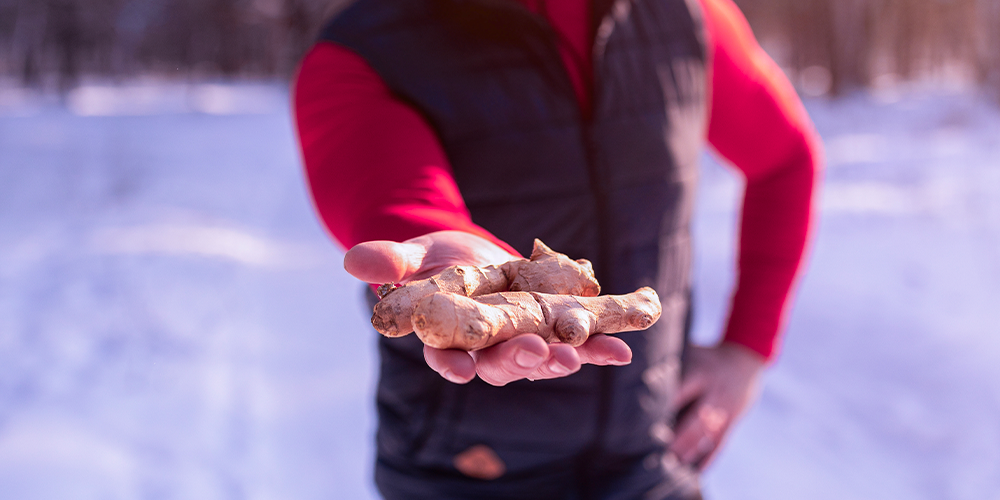As cold temperatures set in, endurance athletes must adapt their nutritional strategy to maximize performance and preserve health. The right nutrition can make the difference between an effective workout and a strenuous challenge. In this article, we will explore the best nutrition practices for dealing with cold weather during endurance sports.
Fuel and Heat: managing the cold during exercise
When temperatures drop, it’s common to experience a decrease in body temperature, leading to increased appetite and feelings of hunger during winter exercise. The cold weather may prompt a need for additional calories to counteract thermal discomfort.
Eating not only provides necessary fuel but also generates heat through thermogenesis, helping to warm the body. It’s important to avoid exhaustion during winter exercise, as the body uses extra energy to maintain body temperature in cold environments. Athletes less accustomed to cold temperatures may rely more on glycogen stores to stay warm.
Carbohydrates for lasting energy
In cold climates, the body burns more calories to maintain body temperature. Carbohydrates offer a sustainable source of energy for endurance athletes. Opt for complex carbohydrates such as whole grains, pasta, and rice to keep blood sugar levels stable during training. Include carbohydrates in meals and snacks before, during, and after exercise. Energy snacks like bananas and cereal bars can help replenish energy during breaks. Ensure that food is easily accessible and can be opened even with winter gloves on.
A lack of carbohydrates can affect the body and make it more susceptible to infection. Therefore, it’s essential to refuel, aiming for a continuous intake of 100-200 calories and 30-60 grams of carbohydrates for every 30-45 minutes of activity. Additionally, after a prolonged workout, consume about 1 gram of carbohydrates per kilogram of body weight.
Protein for muscle repair
Protein is crucial for the muscle repair and growth process, even in colder temperatures. Include lean protein sources in your diet, such as chicken, fish, eggs, and legumes. These foods provide the amino acids needed for protein synthesis, promoting the regeneration of muscle tissue after training.
Consuming adequate protein before training can help reduce post-exercise soreness. Protein not only supports strength and endurance during exercise but also optimizes muscle recovery, ensuring that your body is ready to meet challenges even in the coldest conditions.
Healthy Fats
Fats serve as a concentrated source of energy and can help keep your body warm during winter sports. Choose healthy fats (unsaturated fats) such as avocados, nuts, seeds, and olive oil. These healthy fats not only provide long-lasting energy, but also play an important role in supporting joint health. Fats are also essential for optimizing brain function. A balanced diet containing healthy fats can promote concentration and responsiveness.
Fruits, Vegetables and…Spices!
Vegetables and fruits belong to the category of nutrient-rich foods and are essential for a balanced diet. These foods provide a wide range of vitamins, minerals, antioxidants, and fiber, contributing to the overall health of the body. To strengthen the immune system, particularly in winter, aim to consume a variety of vegetables and fruits as raw (or lightly cooked) as possible. The daily goal should be to consume at least two pieces of fruit and three servings of vegetables.
An often underestimated but of great importance to the body are spices. Spices and fresh herbs should be consumed daily, especially in winter. They promote the immune system and stimulate metabolism. Particularly noteworthy are chili peppers, turmeric, cinnamon, cloves, and ginger, as well as all green herbs, such as oregano, parsley, chives, sage, thyme, rosemary, lovage, basil, cilantro, and dill.
Hydration
Even in winter, hydration is crucial, despite the fact that our brain’s ability to sense thirst is impaired by the cold. The body can deceive on the amount of sweat lost, so it is essential to drink enough before, during, and after exercise. Lower sodium loss in winter requires a conscious effort to maintain fluid balance.
During cold weather exercise, warmer liquids such as tea or broth are ideal, as cold water can cool the body while hot drinks keep it hydrated and warm at the same time. Supplementing hydration with sports nutrition, such as carbohydrate-rich beverages, can ensure complete nutrition during winter, promoting optimal performance and maintenance of overall well-being.
Specific Supplements
During intensive or prolonged training, it may be beneficial to consider taking specific supplements. In winter, when we spend less time in the sun, vitamin D becomes even more crucial, as its deficiency can affect performance and bone health. This vitamin, essential for calcium absorption, also plays a key role in maintaining a functional immune system, helping to prevent a range of health problems.
While the sun is the best source of vitamin D, it can also be obtained from foods such as egg yolks, fatty fish, and fortified dairy products. Alongside this, omega-3 supplements can offer significant benefits, helping to reduce inflammation and improve heart function. Supplementing the diet with these substances can be particularly helpful in maintaining optimal health during times when food sources may be limited or insufficient.
Conclusion
Coping with cold weather in endurance sports requires judicious nutritional planning. Maintain a balance of carbohydrates, protein, and fat, and be sure to stay hydrated. Choose nutritious foods that are also comforting to the body during cold winter days. Adapting your diet to seasonal needs can improve performance, preserve health, and make your workout experience more rewarding.
Create an AI-based training plan for triathlon, cycling, and running with 2PEAK that adapts to your performance after each workout. Download the app and start revolutionizing your training.


